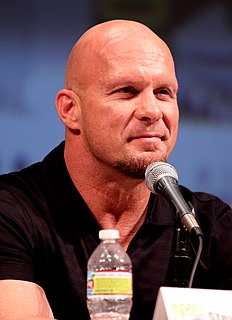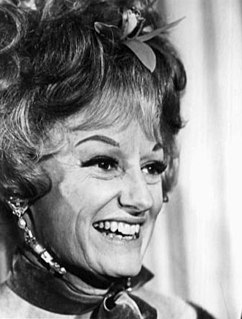A Quote by Stone Cold Steve Austin
I love my mother to death. I'm pretty much a reflection of her.
Quote Topics
Related Quotes
Sometimes," I ventured, "it doesn't occur to boys that their mother was ever young and pretty. . . I couldn't stand it if you boys were inconsiderate, or thought of her as if she were just somebody who looked after you. You see I was very much in love with your mother once, and I know there's nobody like her.
Mother love has been much maligned. An over mothered boy may go through life expecting each new woman to love him the way his mother did. Her love may make any other love seem inadequate. But an unloved boy would be even more likely to idealize love. I don't think it's possible for a mother or father to love a child too much.
Small things such as this have saved me: how much I love my mother — even after all these years. How powerfully I carry her within me. My grief is tremendous but my love is bigger. So is yours. You are not grieving your son’s death because his death was ugly and unfair. You’re grieving it because you loved him truly. The beauty in that is greater than the bitterness of his death.
a mother's death also means the loss of the consistent, supportive family system that once supplied her with a secure home base, she then has to develop her self-confidence and self-esteem through alternate means. Without a mother or mother-figure to guide her, a daughter also has to piece together a female self-image of her own.
When I talk about unrequited love, most of you probably think about romantic love, but there are many other kinds of love that are not adequately returned, if they are returned at all. An angry adolescent may not love her mother back as her mother loves her; an abusive father doesn't return the innocent open love of his young child. But grief is the ultimate unrequieted love. However hard and however long we love someone who has died, they can never love us back. At least that is how it feels.
Her [Eleanor Roosevelt] father was the love of her life. Her father always made her feel wanted, made her feel loved, where her mother made her feel, you know, unloved, judged harshly, never up to par. And she was her father's favorite, and her mother's unfavorite. So her father was the man that she went to for comfort in her imaginings.
Her mother died at the age of 29, essentially turning her face to the wall and deciding to die. And so we can only imagine the agony she felt. And Eleanor Roosevelt really wanted to make her mother happier, and - and to make her live, you know, make her want to live. And there's something about, you know, when your mother dies, this sense of abandonment. I think Eleanor Roosevelt had a lifelong fear of abandonment and sense of abandonment after her parents' death.
Then, there's the modern mother-in-law. In her mid 40s, she is the compact car of her breed: efficient, trim, attractive and in harmony with her times. She's pretty stiff competition for the plain young matron who's overweight and under-financed. If there is going to be friction in this relationship, it could start from envy and resentment in the younger woman. But Father Time is on her side, even if Mother Nature played her a dirty trick
But will I always love her? Does my love for her reside in my head or my heart? The scientist in her believed that emotion resulted from complex limbic brain circuitry that was for her, at this very moment, trapped in the trenches of a battle in which there would be no survivors. The mother in her believed that the love she hadd for her daughter was safe from the mayhem in her mind, because it lived in her heart.

































